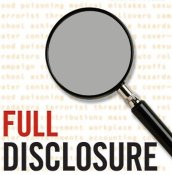It Just Needs To Be Written Better?
Although it is a user’s responsibility to inform themselves of a browser’s features by actually reading the disclosures, the authors assert that these texts need to be written better. They note that only “participants who saw the Chrome or [older version of the] Chrome disclosure gave significantly more correct responses.” “Surprisingly, no other disclosures we tested differed significantly from the meaningless control disclosure, and our results suggest that some disclosures may have led to additional misconceptions.” www.iflscience.com, April 26, 2018, If You Use Your Web Browser’s Incognito Mode We’ve Got Bad News
The lawyer I was speaking to told me that if I did what I said I was thinking of doing then I would be practicing law without a license. What was I doing? Filling out a form for power of attorney (if I recall correctly). In her governing state, such an activity required a lawyer. It turned out that in my state it did not if I filled out the correct form.
From that incongruity, it struck me that since disclosures and license agreements were written by lawyers then accepting a disclosure or license agreement was arguably also practicing law without a license. So it is not surprising that a non-lawyer might not understand things correctly. However, when helping a lawyer friend get his computer set up I asked him if he wanted to see the license agreements. He said “no” and then added that they weren’t in his area of law specialization in any case.
In the early age of computers and shrink wrap licenses, I use to read the licenses because they were full of useful information. I once showed a disbelieving IT guy that I could put a copy of the organization’s purchased software on my personal home PC. It was right there in the license agreement that he had clearly not read. Today, most disclosures and license agreements are densely worded legalese telling me what I can and mostly what I cannot do usually ending with the cop-out “unless otherwise prohibited by law” (i.e., unless we can’t say what we just said).
I always felt that disclosures and license agreements were purposely misleading in an attempt to influence the user’s behavior to do what the vendor wanted, and not to inform the user of all the relevant details. This seemed like a classic extension of marketing where we emphasize one attribute to make the sell while deemphasizing any downside to the buyer (loss of privacy, dangerous side effects, limited use, etc.). Insisting that disclosures and licensing agreements be “better written” assumes that the goal is to achieve understanding by the customer.
Once I concluded that my inability to clearly comprehend these kinds of documents was more by design than by any lack of expertise on my part, it became easier to pick out all the gotchas and the prevarications and to ignore much of the noise and misleading words. Mostly now, I ignore the words and look for practical alternatives to reading these things (e.g., blocking data collection, using VPNs, hacks enabling flexible use, etc.).
What are you doing to ensure your customer can make a good decision that benefits both of you?
